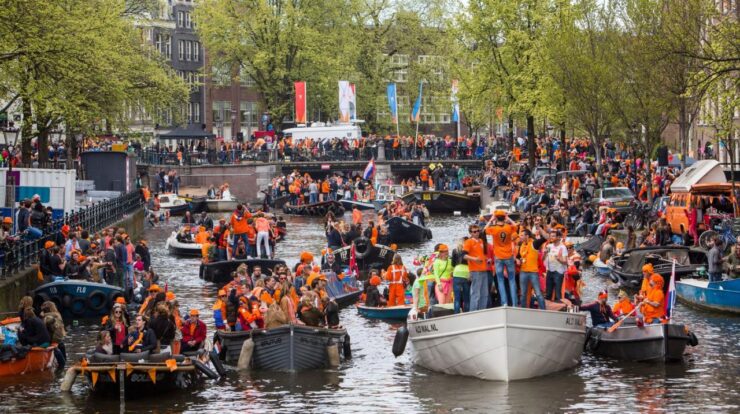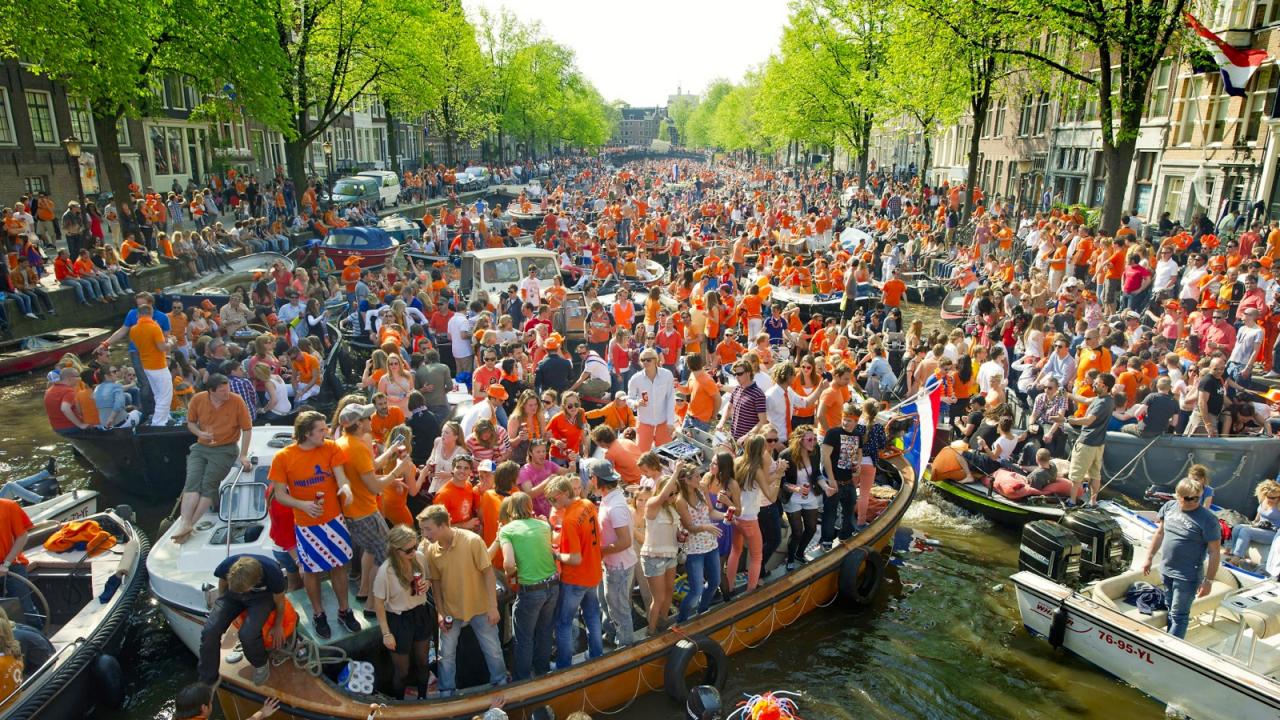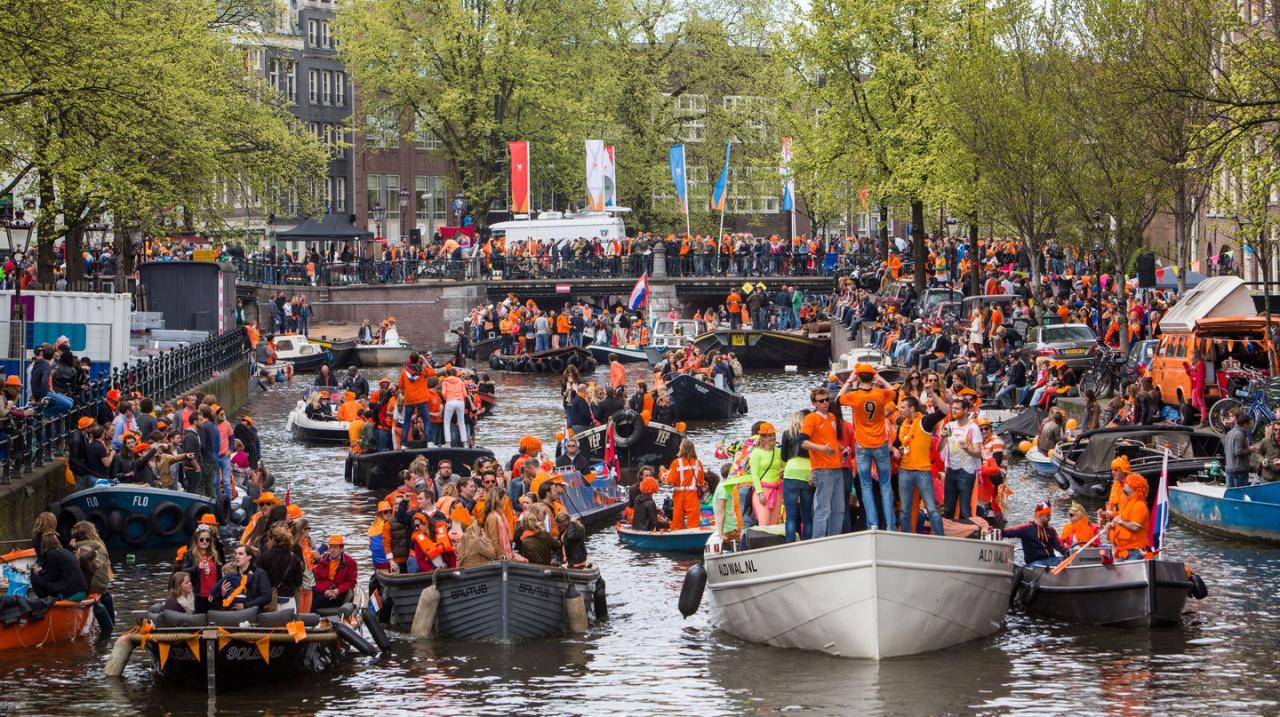
Kings Day Netherlands, a vibrant and colorful national holiday, is a testament to the rich history, traditions, and cultural identity of the Netherlands. Celebrated annually on April 27th, this beloved event transforms the country into a sea of orange, with festivities ranging from flea markets to music performances.
The origins of Kings Day can be traced back to the 19th century, when it was known as Queen’s Day in honor of Queen Wilhelmina. Over the years, the celebration has evolved to honor the reigning monarch, currently King Willem-Alexander, and has become a symbol of national unity and pride.
Historical Significance of King’s Day

King’s Day, a national holiday celebrated in the Netherlands, holds immense historical significance. Its origins can be traced back to the 19th century, when it was established as the birthday of King Willem I. Over time, the celebration evolved, becoming a day of national unity and a tribute to the Dutch monarchy.
Evolution of the Celebration
Initially, King’s Day was a day of official ceremonies and parades. However, in the 20th century, it gradually transformed into a more festive occasion. Street parties, flea markets, and music performances became integral parts of the celebration, creating a vibrant and lively atmosphere.
Traditional Customs and Activities: Kings Day Netherlands

King’s Day is renowned for its unique traditions and activities.
Flea Markets
One of the most popular customs is the nationwide flea market. Streets and squares are transformed into a labyrinth of stalls selling a wide variety of goods, from antiques to secondhand items.
Orange-Clad Festivities
Orange, the color of the Dutch royal family, dominates King’s Day celebrations. People dress in orange clothing, hats, and accessories, creating a sea of vibrant color throughout the country.
Music Performances
Music plays a vital role in the festivities. Live music fills the streets, with bands and performers entertaining crowds in various locations. From traditional Dutch folk music to modern pop and electronic beats, the musical atmosphere is diverse and lively.
Symbolism of Orange
The color orange holds deep historical significance for the Netherlands. It represents the House of Orange-Nassau, which has ruled the country for centuries. During King’s Day, the color symbolizes national unity, patriotism, and the shared celebration of Dutch heritage.
Regional Variations
King’s Day celebrations vary across different cities and towns in the Netherlands.
Amsterdam
Amsterdam, the capital city, is renowned for its grand festivities. The city center is transformed into a bustling hub of activity, with elaborate street parties, live music, and a massive flea market.
Utrecht
Utrecht, known for its picturesque canals, hosts a vibrant celebration centered around the Oudegracht. Boat parties and live music create a unique and lively atmosphere.
The Hague
The Hague, the seat of government, has a more formal celebration. The royal family traditionally attends a ceremony at Noordeinde Palace, followed by a procession through the city.
Economic and Social Impact
King’s Day has a significant economic impact on the Netherlands.
Tourism
The holiday attracts a large number of tourists, both domestic and international. Hotels, restaurants, and shops experience increased business during this period.
Social Significance
King’s Day fosters a sense of community spirit and national pride. It brings people together from all walks of life to celebrate their shared Dutch heritage. The shared experiences and traditions strengthen the bonds of unity within the nation.
Contemporary Adaptations
King’s Day has evolved in recent years to reflect changing societal norms and trends.
Social Media
Social media platforms play a prominent role in the celebration. People share photos, videos, and updates about their King’s Day experiences, creating a virtual community of celebration.
Technology
Mobile apps and online platforms have made it easier for people to find events, plan their day, and connect with others during King’s Day.
Sustainability Initiatives
There is a growing emphasis on sustainability in King’s Day celebrations. Many cities and towns implement measures to reduce waste and promote environmental awareness.
Cultural Comparisons
King’s Day shares similarities with other national holidays celebrated in different countries.
Bastille Day (France)
Both King’s Day and Bastille Day are national holidays that commemorate historical events and foster national pride. They feature parades, fireworks, and festive gatherings.
St. Patrick’s Day (Ireland)
Like King’s Day, St. Patrick’s Day is a celebration of national heritage and culture. It involves wearing green clothing, attending parades, and enjoying traditional Irish music and food.
Independence Day (United States), Kings day netherlands
Independence Day in the United States and King’s Day in the Netherlands both involve patriotic displays, fireworks, and community gatherings. They celebrate the founding principles and shared values of their respective nations.
Final Wrap-Up
In recent years, Kings Day has embraced contemporary adaptations, incorporating social media, technology, and sustainability initiatives into the festivities. While the core traditions remain strong, the celebration continues to reflect the changing societal norms and trends of the Netherlands.
Kings Day Netherlands stands as a unique and captivating national holiday that showcases the vibrant spirit and rich cultural heritage of the Dutch people.
FAQ Section
What is the significance of the color orange in Kings Day celebrations?
Orange is the national color of the Netherlands and is associated with the royal family. It is believed to have originated from the House of Orange-Nassau, which has ruled the country for centuries.
What are some of the traditional activities associated with Kings Day?
Flea markets, music performances, street parties, and orange-clad festivities are all common traditions associated with Kings Day.
How has Kings Day evolved over the years?
Originally known as Queen’s Day, the celebration has evolved to honor the reigning monarch and has embraced contemporary adaptations such as social media, technology, and sustainability initiatives.





